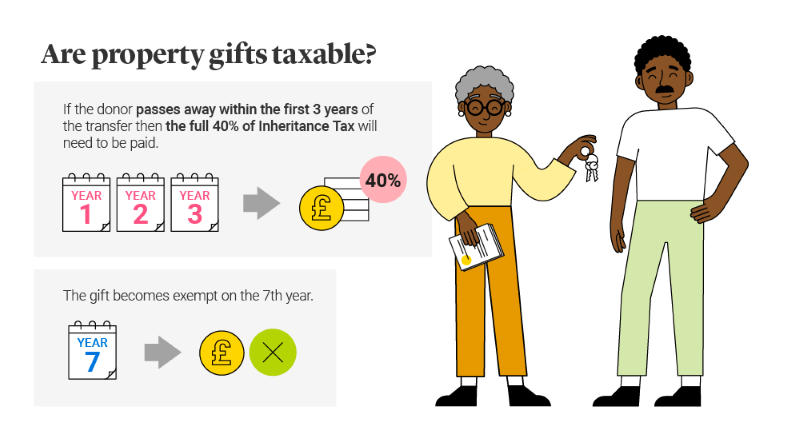Estate planning
What is estate planning?
Estate planning means working out how you’d like your assets to be managed and passed on after your death. It’s as important as making a will because it can:
- Make your executors and loved ones' lives easier
- Protect your estate for your beneficiaries
- Help you understand how much Inheritance Tax (IHT) might be due
That final point is particularly important. When you're estate planning, it's very important to understand IHT, which may be due if your estate is:
- Worth more than the IHT threshold (AKA the nil rate band - it's currently £325,000)
- Not going to a spouse, civil partner or other exempt beneficiary, like a charity
IHT regulations can change at any time, and the rules around tax, gifts and trust funds are complex. So, we're not going to talk about it in too much detail in this article. It's a good idea to consult a professional financial adviser and a solicitor (ideally an estate planning law specialist) to get some expert estate planning advice before you make any decisions.

You may also be interested in...
To plan your estate, there are some basic steps you’ll probably need to work through:
- Assess your net worth by adding up all your assets and taking away any liabilities
- Work out where you want everything to go after your death – for example:
- leaving your house or money to loved ones
- setting any conditions your beneficiaries have to fulfil to get their gifts
- Making the right arrangements (like a will) to make sure your wishes are legally binding
That’s a simple list but in practice estate planning can be a complex task. And because individual estates vary so much, it’ll be different for everyone.
As we’ve noted above, many financial and legal professionals offer estate planning services and can offer very useful advice and support. If you’re not already getting that sort of advice, you can visit Unbiased.co.uk to find a financial adviser or for legal advice go to Solicitors Regulation Authority.
What should your estate plan include?
Leaving property
If you leave a home to your spouse or civil partner, they won’t have to pay IHT on it. If you leave it to someone else, it counts towards the value of your estate so IHT might be due on it. As ever, check with an expert to understand how IHT could apply in your case.
If you own a property as a joint tenant, your half share will automatically pass to your co-owner when you die. You can’t pass on your ownership in your will. If you own a property as tenants in common, you can choose who gets your share.
Other key points to think through include whether:
- There’s an outstanding mortgage which your legal representative will need to pay out of the estate
- You want to give someone a right of residence in your home
And finally, people often ask:
Is a house part of the residue of the estate?
Like any other asset, it can be if you don’t leave specific instructions about it in your will.
Can I leave a leasehold property in my will?
Yes, you can pass it on to anyone you choose. They inherit any remaining time on the lease.
Leaving other assets
To make sure that everything goes to the right person, you'll need to put together a full list of your assets and be clear on who gets what. Assets can include:
- Your money - investments, pensions, savings, etc
- Your possessions (cars, jewellery and anything else of value)
- Any insurance policies that may pay out when you die
Make sure you get your assets valued regularly so you always have an accurate picture of your estate's total value. Changes in their value could also affect who you want to leave them to. And again, make sure you've worked through any IHT implications with an expert.
Making funeral arrangements
You can use your will to let people know any funeral wishes you have and make plans to pay for them. Your wishes won't be legally binding, but hopefully your loved ones will respect them.
Along with any taxes and debts, funeral payments are the first costs your estate will cover. Any remaining money - sometimes known as the residue of your estate - will only go to your beneficiaries once they've been paid.

Managing your digital estate
More and more people are realising that when estate planning they can add a digital assets clause to their will. People are making more general digital estate plans and that's because digital assets like family photos or a music collection can now be treasured possessions.
You might also want to let people know how to access and what you want done with your social media accounts when you're no longer around.
What else can you do before you pass on?
Gifting property

If you want to give the property away but still live in it, you can:
- Pay the proper commercial rent to the new owner, which could keep any IHT benefits of giving it away.
- Stay in it rent-free (known as a 'Gift with Reservation of Benefit'), which removes any IHT benefits of giving it away. When you die, the property will fall back into your estate for tax purposes, even if you live for more than seven years after giving it away.
As ever, you need to make sure you understand the IHT implications of gifting property. Make sure you consult an expert before making any final decisions. And bear in mind that if you give away your property while you're still alive, you could run into problems. The new owner could:
- Increase the rent with due notice
- End your tenancy agreement
- Sell the property without having to ask your permission
Releasing equity with a lifetime mortgage
You might want to share some value of your property without having to sell up or move out. If that's the case, a lifetime mortgage (LTM) might be right for you.
An LTM is a loan secured against your home. It will let you release some of your property's value as cash, but you won't have to move out or sell up. Your LTM won't need to be repaid until you either die or move into full time care. And unless you choose otherwise, you won't need to make any repayments until then. If you go for a Payment Term Lifetime Mortgage (PTLM) you must pay back the interest every month for a chosen payment term up until you plan to retire, or you turn 75 (whichever comes first). This will reduce the overall amount you owe though as a last resort your home may be repossessed if you don't keep up with the payments.
It's important to understand the possible IHT implications of gifting LTM money. For more information about that, take a look at our Equity release inheritance tax article.
If you're aged over 55 (or over 50 for a PTLM) an LTM might be right for you. To find out more about how they work, you can:
- Visit our Lifetime Mortgage page to learn more about our LTM products
- Use our Lifetime Mortgage Calculator to see how much equity you could release
Important LTM points to bear in mind
Any unpaid interest is added to your loan. The amount you owe can increase quickly. That will come out of the value of your home, so there will be less to leave your loved ones after you pass on. But LTMs have a No Negative Equity Guarantee, so they'll never need to pay back more than the value of your home. This won't apply to any missed monthly payments and the interest on them.
LTM payments are tax free, but they might affect any means-tested state benefits you're getting. LTM interest rates can be quite high, so you should check to see if you can access cash in other cheaper ways. There might also be an Early Repayment Charge if you pay back your LTM early.
Making other financial plans for friends and family
Careful financial planning is an important way of protecting your estate. It can make sure that your financial wishes are followed if you become incapacitated before you pass on. It can also help you understand how much IHT might be due on your estate, which could affect how you share it out.

Gifting money before you pass on
You can give up to £3,000 in any one tax year IHT free. And if you don't give some or all of that amount, you can carry the balance forward to the next tax year.
- For example, if Mary gifts £1,500 in tax year 1, she can carry forward £1,500 and have a £4,500 IHT exemption in tax year 2. But if she doesn't use it in year 2 she can't carry it forward to year 3.
Some types of gift might be completely exempt from IHT. They include gifts between spouses or civil partners and those given over seven years before your death. And if you're thinking about helping your grandchildren, read our guide to gifting as a grandparent.
Your executors will need to declare any cash gifts you make in the seven years before your death. So, it's important to keep records of them and make sure the relevant people know where to find them.
Setting up a power of attorney
A power of attorney is a very important wealth planning tool. It's a legal document that lets you appoint one or more people to either:
- Help you make decisions
- Make decisions on your behalf
It's usually set up as a peace of mind measure, so (for example) you know everything's taken care of if you run into mental incapacity problems. It can be a good opportunity to chat through your wishes with your loved ones and deal with any questions or worries they may have.
To find out more take a look at our power of attorney article.
Planning ahead with our Over 50s Fixed Life Insurance
Our Over 50s Fixed Life Insurance can help you with your estate financial planning, letting you leave a small fixed cash sum to your loved ones when you pass away. Putting it in trust can be tax efficient too.
To find out more:
- Visit our Online Trust Hub for more information about trusts in general.
- Read about our new Digital Trusts, which you can set up entirely online.
The cash sum from your Over 50s Fixed Life Insurane policy could be used to help contribute towards your funeral costs. If this is the case, you could choose to add the Funeral Benefit Option to your plan at no extra cost. Terms and Conditions apply.